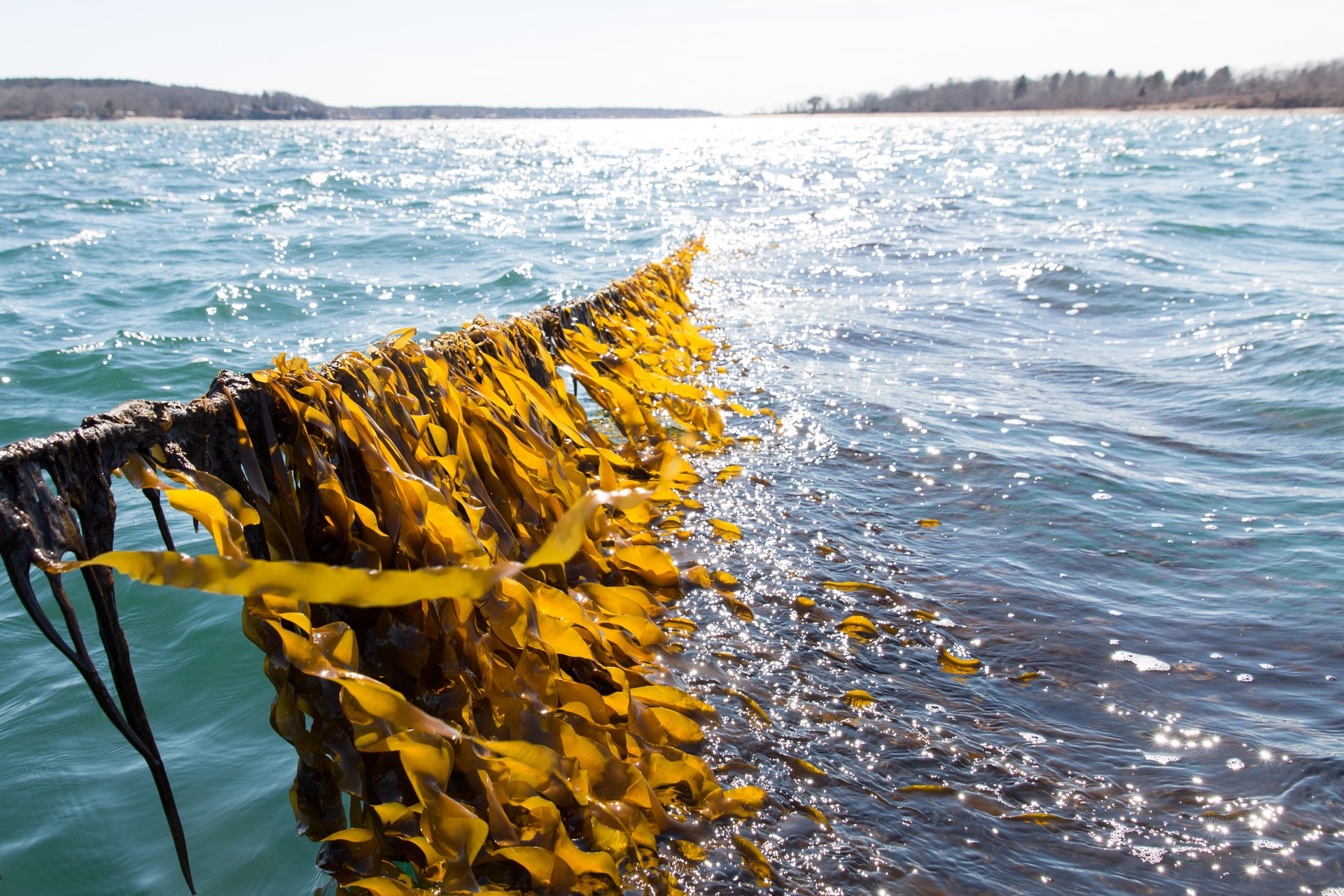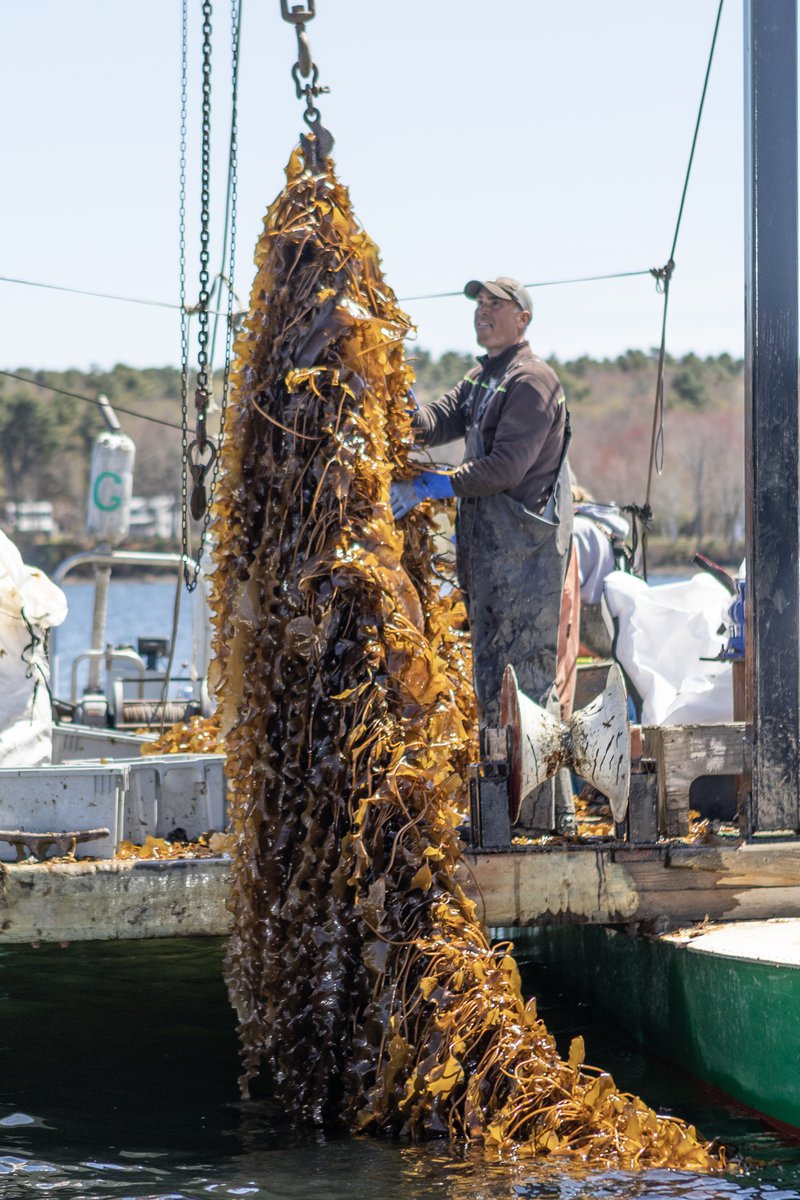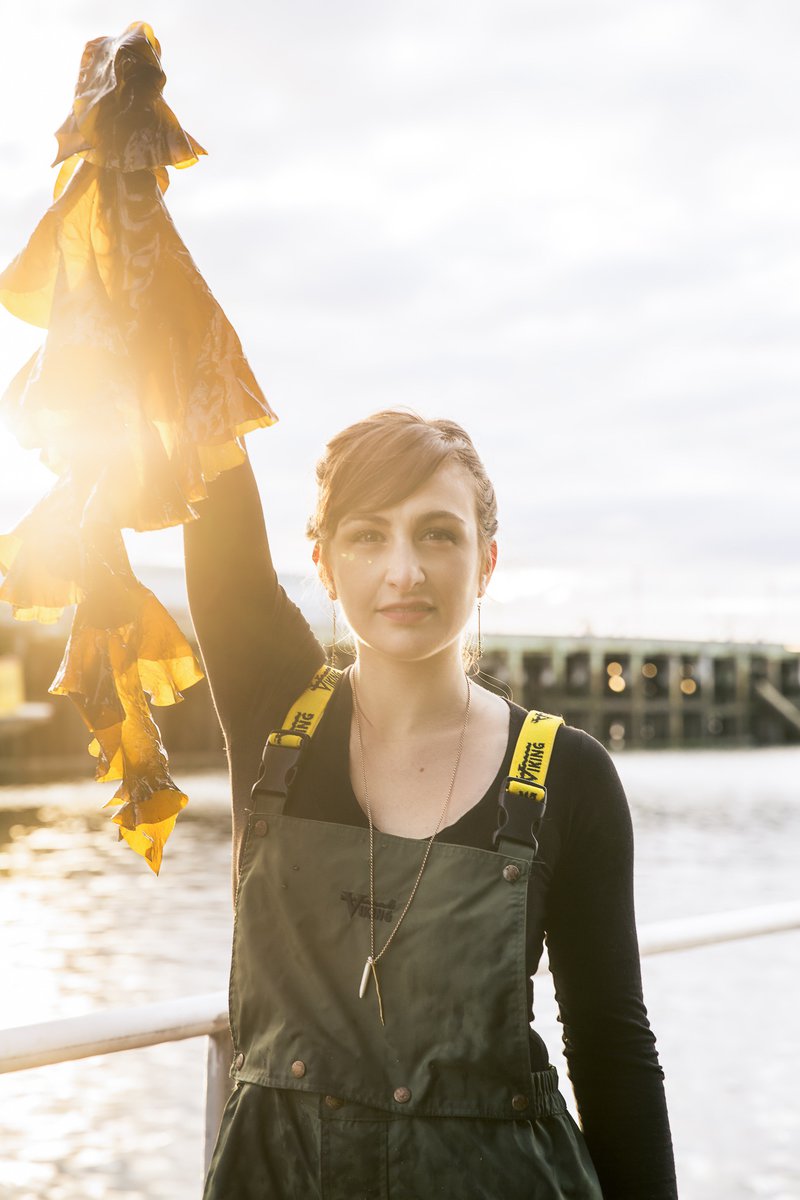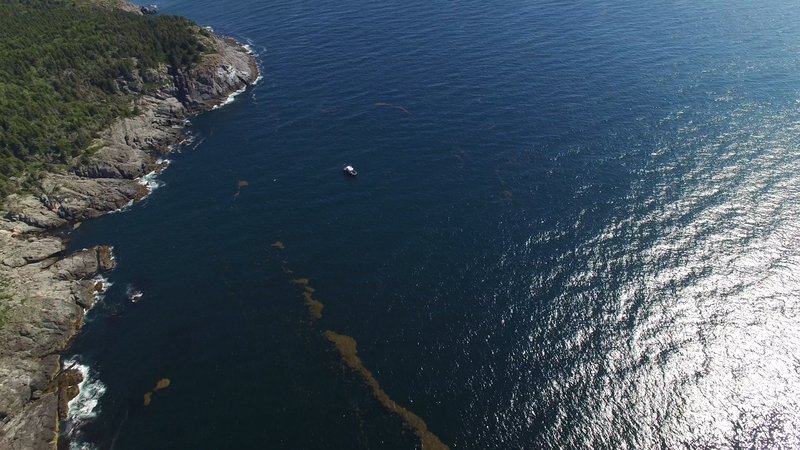Maine-Grown Kelp: Opportunity & Impact
Perspectives | Oct 27, 2020
The Gulf of Maine is leading the growth of the kelp aquaculture industry in the United States. We checked in with leading industry voices and GMRI experts to learn more about the impact of farm-raised kelp in the Gulf of Maine.

Why Gulf of Maine kelp?
Almost all kelp sold in the United States is produced in and imported from other parts of the world, but today, Maine-grown kelp is emerging as a superior alternative in our region. Thanks in part to its exceptional water quality, the Gulf of Maine is becoming the nation’s hub of fresh kelp farming. While imported kelp products are usually dried and rehydrated with chemicals and dyes, kelp products from Maine's cold, clean waters can go directly to market without the added processing.
In addition to water quality, the changing seasons in the Gulf of Maine also contribute to the emergence of a farm-raised kelp industry. As the seasons turn from summer to fall to winter, local demand for lobster wanes. The departing masses of lobster-craving tourists coupled with the migration of lobsters offshore for the winter motivate many fishermen and coastal communities to seek supplemental sources of income. Fortunately, kelp offers another climate-resilient seafood product from the Gulf of Maine. Conveniently, harvest (April-June) times align with the lobster offseason.
Kelp offers a promising way for fishermen to diversify their income streams in the lobster offseason, and it's also the newest seafood product we’ve verified under our Gulf of Maine Responsibly Harvested® label.


Seeds of Success
Atlantic Sea Farms is leading the charge in Maine’s farm-raised kelp industry by working with a network of partner farmers hoping to diversify their income streams.
“Nobody else is doing fresh kelp at scale in the country right now, so we’re really forging an entirely new segment of the market,” Atlantic Sea Farms CEO Briana Warner said. “Our primary objective right now is to help provide a stable, supplemental income source for fishermen in the lobster offseason.”
Atlantic Sea Farms grows kelp seeds in its state-of-the-art nursery, and provides them at no cost to their partner farmers, many of whom already have most of the tools and skills necessary to start kelp farms without incurring additional costs. In addition to providing farmers with free seeds, Atlantic Sea Farms also helps farmers locate and secure farm locations, provides technical assistance in the setting up of their farms, and offers guidance on seeding and harvesting techniques.
Since Warner took over at Atlantic Sea Farms in 2018, the line-grown kelp industry in the state has surged. According to Warner, Maine's line-grown kelp supply has grown significantly in the last year and a half, from about 40,000 pounds to 500,000 pounds.

Kelp and Sustainability
As Atlantic Sea Farms demonstrates the economic opportunity for kelp in the Gulf of Maine, growth in any industry inevitably raises questions about environmental sustainability and climate impacts. So, what does the presence of kelp farms mean for coastal areas facing the impact of a changing climate?
“From a climate solutions perspective, I see kelp farming as one of those coveted win-win options,” said Dr. David Reidmiller, the director of our new climate center. “Not only is kelp a natural carbon sink that has the potential to reduce ocean acidification locally, but kelp farms can also attenuate incoming waves, therefore reducing the risks to coastal communities from harmful storm conditions.”
For Warner, the climate resilience aspect of kelp farms is part of what makes this industry so exciting. Since Atlantic Sea Farms is committed to helping fishermen reckon with climate-related impacts to their fisheries, Warner sees kelp as crucial to this effort.
“Kelp supports resilience along the coast for people who otherwise are 100% at the mercy of lobster prices and lobster landings," said Warner. "It both helps in the adaptation to and mitigation of some of the effects of climate change, which is really exciting.”

Gulf of Maine Responsibly Harvested® Verified Species
Explore the full list of species verified as Gulf of Maine Responsibly Harvested®, including detailed assessment reports.
Kelp Verified as Gulf of Maine Responsibly Harvested®
Those familiar with the kelp industry, like Warner, understand the sustainability benefits kelp offers the region, but it's helpful to have these claims verified by an external source. However, global sustainability certifications can be costly for small businesses in emerging markets. That's why Warner turned to Kyle Foley, our Senior Sustainable Seafood Program Manager, who supports our Gulf of Maine Responsibly Harvested® program.
“Atlantic Sea Farms was seeing market demand for eco-labels and sought verification that their product was responsibly harvested,” said Foley. "It was a great fit because that’s exactly the point of our program — to give the region’s seafood industry access to rigorous, detailed, trustworthy verifications that can open up new potential markets.”
Kelp, though, differs from the other verified Gulf of Maine Responsibly Harvested® species, such as American lobster, haddock, or Atlantic sea scallops. To develop new assessment criteria for the responsible harvest of an aquaculture product like kelp, our seafood team gathered input from the aquaculture industry and held internal discussions with GMRI research staff and aquaculture experts.
Their efforts led to the development of responsible harvest criteria founded in the best management and science practices, which were then used to assess farming practices for the three main species of kelp in the state.
“We developed strong criteria that allowed us to do a rigorous investigation of how kelp is managed, and what the best available science says about farmed kelp's environmental impact,” Foley said.
Kelp Verification Report
Explore the assessment of Maine kelp against our criteria in our kelp verification report.
After developing the new criteria and using them to assess Maine’s kelp farming practices, the team wrote a detailed report, which then entered an internal review phase led by an interdisciplinary team of GMRI scientists, seafood experts, and aquaculture program staff. When the report was complete, a pool of external reviewers also provided critical outside perspectives and feedback.
“We always have at least three external scientists who individually review our verification reports. Then we bring them back together to discuss their feedback as a group,” Foley said. “They're a very important part of the process.”
At the end of this meticulous and collaborative process, the GMRI seafood team made the decision to verify kelp farmed in the state of Maine as Gulf of Maine Responsibly Harvested® based on both the internal and external review of experts.
“The Gulf of Maine Responsibly Harvested program gives us that extra boost of legitimacy,” Warner said. “That stamp can be really helpful in forging partnerships when we can point to another legitimate group that can support our claims of sustainability.”
Kelp is a climate-resilient, responsibly harvested aquaculture product, as well as a versatile, nutrient-dense superfood that you can buy in a variety of delicious forms. Farm-raised kelp from the Gulf of Maine also has the power to foster economic resilience in our coastal communities.
One thing kelp can’t do is purchase itself — so make sure to look for kelp products in your nearest grocery stores to add a dash of healthy seafood to your recipe repertoires. You can feel even better about it, too, knowing Gulf of Maine kelp is verified to be responsibly harvested.



